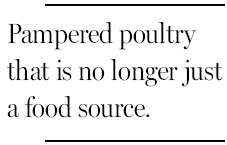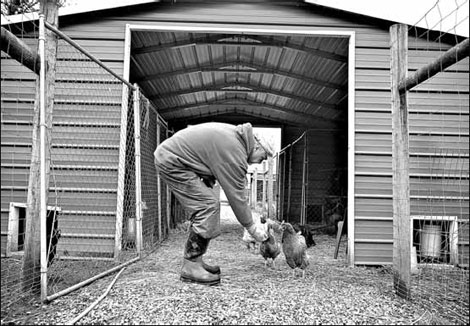For suburban chickens, a decent spot for retirement
|
Wayne Geiger has 100 "retired" birds from the city at his Lighthouse Farm Sanctuary in Scio, Oregon, and visitors come to see them. Leah Nash for The New York Times |
PORTLAND, Oregon - Hindus regard chickens as vessels for evil spirits. The Chinese cook them to honor village deities. But here, chickens are a symbol of urban nirvana, their coops backyard shrines to a locavore movement that has city dwellers moving ever closer to their food. And the increasingly intimate relationships have led to a budding phenomenon: urban chicken retirement.
Because most chickens lay the majority of eggs early in life and can live about 10 years, the quest for a place for them to live out their lives has brought a boom to at least two farm animal sanctuaries and led Pete Porath to expand the portion of his business that finds new homes for unwanted birds.
Mr. Porath, who brokers chicks to feed stores and other buyers from his two-hectare farm in Estacada, "rehomes" up to 2,000 birds a year.
"We have rehomed all kinds of stuff. Ducks, chickens, peacocks, turkey, quail, guineas," he said. "Birds that we rehome out of the city, we have a policy that we don't eat them."
His indulgence has lured gawkers to his property, about 50 kilometers southeast of Portland, much to the chagrin of his wife, Tanisha. She says some stroll the garden, eating the produce.
"I think it's one of these things when people have a vision of coming to our house and it's a park. And they think, 'Oh, this is where my chicken is going to live.' They want it rehomed here because they have a fantasy of a farm," she said.
Wayne Geiger, who has about 100 city birds at Lighthouse Farm Sanctuary in Scio, about 110 kilometers south of Portland, agrees. "People think they go out to the sanctuary and they go skipping through the meadows and the fields are covered in daisies," Mr. Geiger said.
He says that in fact, the birds must often be penned to limit breeding, cockfights and predator attacks.
Russ Finley, 54, an architect, is among 525 Portland-area homeowners with permits to surpass the three-chicken limit.
That number is sharply up since 2000, when only about 20 properties had such permits.

Mr. Finley once retired a disruptive brooding bird, as well as another chicken that had formed a strong bond with it.
He said he had no problem with killing chickens, and he eats meat. But in this case he just could not do it.
"They have personalities," he explained. "And they each have different ways of interacting with you."
He said the five birds he now owns are a food source. But they are also pets, he said, part of a family that includes his partner, Ray Frye, two dogs and two cats.
"We name them and we hold them," he said. "I know it sounds kind of crazy, but we kiss them."
The couple buy toys for their chicks, and enjoy watching the older birds jump for Cheerios.
Their multilevel chicken coop was featured in the city's 2011 Tour de Coops, showcasing the most spectacular bird lodgings.
Retiring chickens, Mr. Porath said, is easy. They are steered toward farms where they eat pests and are used for breeding, to turn compost, to keep grass down, and as pets.
Karen Wolfgang of Independence Gardens, a consulting firm that helps clients build sustainable gardens, has become an expert on end-of-life issues for chickens. She teaches a course to help urban farmers plan a wholesome end for their chickens.
The class that includes information on butchering techniques, and referrals to retirement farms.
"Our relationship with the nonhuman world is complicated," she said. "We did breed domestic animals to do what we need them to do, but what we need them to do is changing."
The New York Times



















